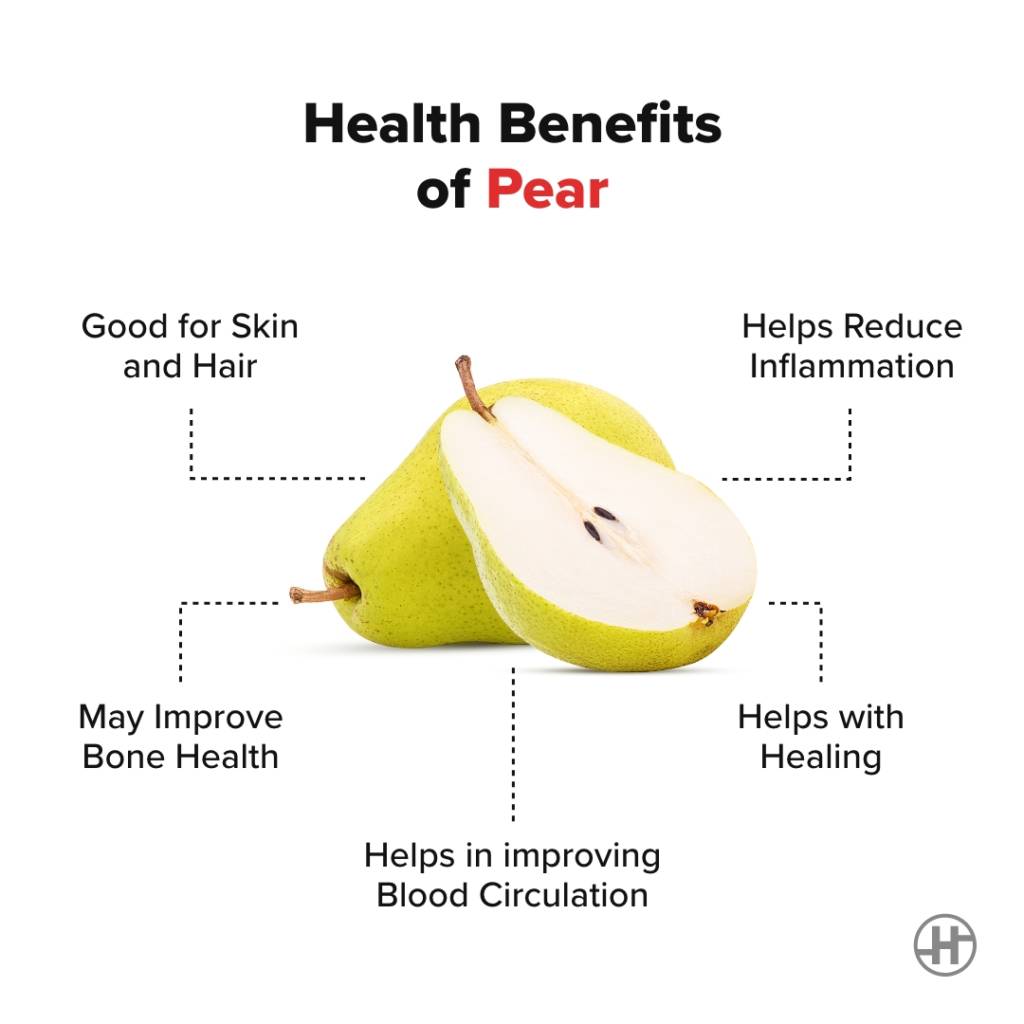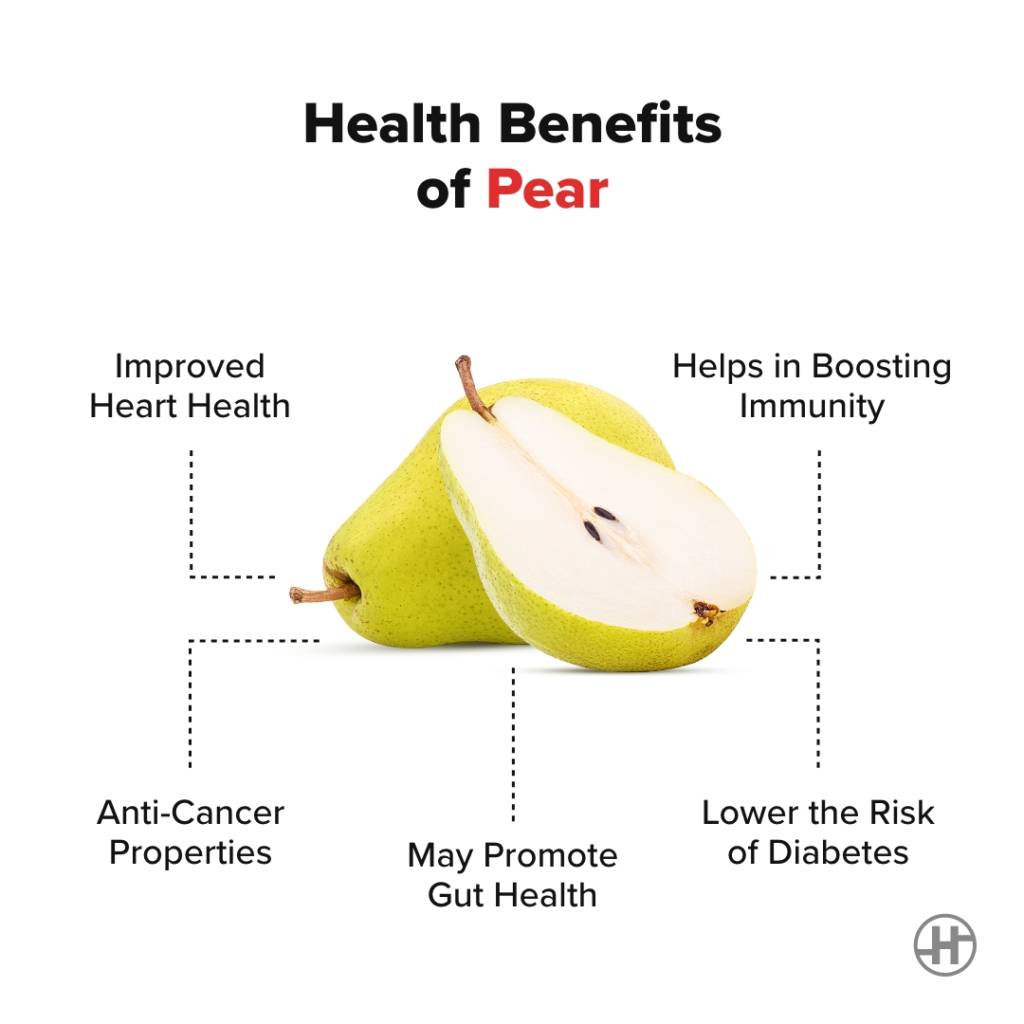Pear Fruit – Health Benefits, Nutrition, and Recipes

Dr.Swati Shukla
November 22, 2024

Dr.Swati Shukla
November 22, 2024
Welcome to the world of the delightful and nutritious Pear fruit! Bursting with flavour and packed with essential nutrients, Pears have been cherished for centuries as one of nature’s most exquisite gifts. From their juicy, succulent flesh to their unique shape and vibrant colours, Pears offer not only a delectable taste but also a plethora of health benefits.
Loaded with vitamins, minerals, and dietary fibre, Pears make for a perfect addition to your daily diet. Whether you enjoy them fresh, baked, poached, or blended into a smoothie, Pears can easily elevate any culinary creation with their natural sweetness and subtle aroma.
In this exploration of the Pear fruit, we will delve into the remarkable health benefits it offers, its impressive nutritional profile that will inspire you to incorporate this versatile fruit into your meals. We will also discuss th potential health risks associated with pear consumption to help you make informed dietary decisions.
So, join us on this journey to discover the goodness of Pears and unlock a world of delicious possibilities for a healthier and more vibrant lifestyle!
According to USDA, a 100-gram serving of pears contain
Pears have been enjoyed since ancient times. These bell-shaped fruits are sweet with a little tang of sourness can be eaten soft or crisp. They offer a plethora of health benefits that have been backed by science and medicine. Let’s learn how eating pears are beneficial for your health.

Vitamin A is the most versatile nutrient. It is beneficial for keeping the skin, hair, and nails healthy and beautiful. Pears contain good amounts of vitamin A which can help in keeping your skin and hair healthy. It is also enriched with nutrients like zeaxanthin and lutein that take part in a number of organ functions and enzymatic reactions.


The fruit contains copper, calcium, phosphorus, manganese, and magnesium in significant amounts, which all play a crucial role in bone health. These minerals might be required in very small amounts but play a crucial role in keeping the bones strong. People with conditions like osteoporosis are advised to include pears in their diet as it helps prevent and treat debilitating conditions and bone mineral loss. It ensures that your bones are getting enough minerals to grow and protect against inflammation and other conditions.
Pears are rich in flavonoids and antioxidant components. Research has shown that the anti-inflammatory properties of pear help in reducing swelling and pain associated with inflammation. People suffering from symptoms of gout, rheumatic conditions like arthritis, and the like should eat pears to ease the symptoms and prevent them from worsening thereby also improving the quality of life.
There are several studies that show a close association between inflammation and metabolic diseases like diabetes, heart disease, and even cancer. Also, nutrients like vitamins C and K help in fighting inflammation, which are found in abundance in pears.
Pears can be very beneficial for patients suffering from mineral deficiencies like anaemia, among others, as they are high in iron and copper content. Increased levels of iron in the body boost the synthesis of red blood cells. Additionally, increased levels of copper in the body facilitate the synthesis of essential minerals and the absorption of iron into the system.
When your body has sufficient minerals to support the organs, you can prevent muscle weakness, cognitive malfunction, fatigue, and organ system malfunction. This is the reason why doctors advise kids and adults equally to consume foods rich in adequate amounts of copper and iron. With pears, you can ensure a significant percentage of these essential minerals in your diet.
Pears are a good source of vitamin C and thus help in healing wounds. Ascorbic acid helps in synthesising cellular structures of the body and new tissues in the various organs. So, whenever there is a burn or cut, it makes sure that the damaged area is healed quickly. If you are injured, you can include pears in your diet for fast healing.

Several studies emphasize the impact of pears on heart health. According to these studies, pears are one of the fruits that have an inverse relationship with stroke risk. Pear fruit is high in potassium content, which according to research, acts as a vasodilator that helps in lowering the blood pressure. This results in increased blood flow in all parts of the body that helps in providing oxygen to organs. This oxygenation of the organs promotes their effective function. Also, the high fibre content in pears ensures good heart health.

Vitamin C and vitamin A found in pears, benefit in boosting immunity. Pears are a rich source of vitamin C minerals that work as a great antioxidant. Antioxidants help in stimulating the production of white blood cells, which are critical to the immune system. This ultimately makes your immune system stronger, allowing your body to ward off conditions like mild illnesses like flu, cold upset stomach, and more. Also, due to their free radical scavenging activity, antioxidants prevent any damage caused by free radicals.

The antioxidant properties in pear have the potential to kill cancer-causing cells in our bodies. Antioxidants are renowned for their anti-carcinogenic activities that have been connected to the prevention of cancer. According to studies, phytonutrients like flavonoids and cinnamic acids found in pears help reduce the risk of cancer. The antioxidants work in a way that they flush out free radicals from the body, allowing for new and healthy cell growth.

The red varieties of pear are typically known to help in reducing the risk of diabetes. Pear is an anthocyanin-rich fruit, which is inversely related with diabetes. During a study, it was found that over 200,000 people who consumed five or more weekly servings of red pears were 23% less likely to experience type-2 diabetes. Furthermore, pear peel contains anthocyanins that exhibit both anti-inflammatory and anti-diabetes effects.
Since pear is a fibrous fruit, it slows down the digestion process, giving your body more time to break down and absorb carbs. As a result, your blood sugar levels regulate properly, potentially helping you to control and prevent diabetes.
As stated above, a pear is an excellent source of insoluble and soluble fibre that is essential for digestive health. Consuming fibre-rich foods is important as it helps in maintaining bowel regularity by bulking up and softening the stool. A single pear contains about 6 grams of fibre, which is 22% of your daily fibre needs. So, by eating a pear a day, you can keep your digestive system on track. Moreover, soluble fibres are responsible for feeding healthy gut bacteria. Healthy gut bacteria mean improved immunity and healthy ageing.

For starters, pears are rich in fibre content that helps you feel satiated for a longer duration. This prevents you from munching at odd hours. Moreover, pears are one of the few fruits that are low in calories.
The fruit is high in water content which makes it high in volume but low in calories. Last but not least, pears aid healthy digestion, which is crucial for healthy weight loss. It helps fight constipation. And as we know, a healthy digestive system is linked to healthy weight loss. All these factors make pear a perfect fruit for weight loss.
Pears, enjoyed since ancient times, offer a myriad of health benefits. Rich in vitamins and minerals, they promote healthy skin, hair, and bones. Pears’ anti-inflammatory properties can reduce swelling and pain, benefitting those with conditions like arthritis. Their iron and copper content aids in better blood circulation and wound healing. Pears are linked to improved heart health, boosted immunity, and potential anti-cancer effects. Additionally, they may lower the risk of diabetes and promote gut health, aiding weight loss due to their high fibre and water content. With their delightful taste and numerous advantages, incorporating pears into your diet is a delicious and nutritious choice for overall well-being.
While pears are generally safe and beneficial for most people, like any other food, they may cause allergies or pose some health risks in certain individuals. Here are some potential allergies and health risks associated with pears:
Pears belong to the Rosaceae family, which includes other fruits like apples and cherries. If you have a known allergy to any of these fruits, there’s a possibility of being allergic to pears as well. Common symptoms of a pear allergy include itching or tingling in the mouth, swelling of the lips, tongue, or throat, hives, and gastrointestinal discomfort. Severe reactions may lead to anaphylaxis, which is a life-threatening allergic response requiring immediate medical attention.
Pears, like many other fruits, contain natural sugars, including fructose. Some individuals may have difficulty digesting fructose, leading to fructose intolerance. Symptoms of fructose intolerance include bloating, gas, diarrhoea, and abdominal pain.
Oxalates: Pears contain oxalates, which are naturally occurring compounds found in various plant-based foods. In some individuals, high oxalate consumption can lead to the formation of kidney stones.
People with GERD or acid reflux may experience worsened symptoms after consuming pears due to their acidic nature.
While the fibre in pears is generally beneficial for digestive health, consuming too many pears or other high-fibre foods in a short period can lead to bloating, gas, and discomfort for some individuals.
Pears contain fermentable carbohydrates known as FODMAPs, which can trigger digestive issues in individuals sensitive to these compounds. FODMAP sensitivity can lead to symptoms like bloating, gas, and abdominal pain.
Pears may pose health risks and allergies for certain individuals. Allergic reactions, fructose intolerance, and potential kidney stone formation due to oxalates are possible concerns. Pesticide residues in conventionally grown pears may also present risks, while GERD sufferers may experience worsened symptoms. The high fibre content can lead to discomfort, and FODMAP sensitivity may cause digestive issues. Cross-reactivity with pollen allergies can trigger oral allergy syndrome. Those with known allergies or sensitivities should exercise caution, and seeking medical advice is crucial if any adverse reactions occur.
Pears are beneficial to your digestive system, heart, and blood glucose levels. They are also free-radical fighters. Pears have high levels of folate, vitamin C, copper, and potassium. They’re also high in polyphenol antioxidants. Pears include prebiotics, which promote bowel regularity, constipation alleviation, and overall digestive health. Eat your pear with the skin on to get the maximum fibre.
In conclusion, pears truly embody nature’s perfect combination of delectable taste and incredible health benefits. From their ancient origins to their continued popularity, these bell-shaped fruits have stood the test of time as a cherished part of our diet. Packed with essential nutrients like vitamins A and C, potassium, and dietary fibre, pears offer a range of advantages, including improved skin and hair health, better bone strength, reduced inflammation, enhanced heart health, and a strengthened immune system. Additionally, their potential role in preventing diabetes, aiding in weight loss, and promoting digestive health makes them an ideal addition to any balanced diet. However, it’s crucial to be mindful of potential allergies and health risks, as certain individuals may experience adverse reactions. Overall, embracing the wonders of pears allows us to savour both their delightful taste and the incredible well-being they bring to our lives, making them a true gift from nature.
A. Like all fruits, pears are also high in fructose or fruit sugar and overindulgence can lead to digestive issues. Therefore it is recommended to stick to 1 or 2 per day as it will provide you with the right amount of nutrients needed for the body.
A. Yes, pears are rich in Vitamin C which boosts our immunity and can help ward off colds and flu.
A. The high fibre content of pear can cause bloating and gas in some people. It is advisable to eat pear as a mid-snack and not with other food and chew it properly to prevent gas formation.
A. Yes, pear is rich in fibre which slows down digestion and keeps sugar levels stable for a longer time. Pear is also rich in anthocyanins which are known to help regulate sugar levels.
A. Pears contain a lot of essential vitamins and minerals as well as good fibre which can be good for a healthy pregnancy.


Thank you for teaching us about benefits of pear